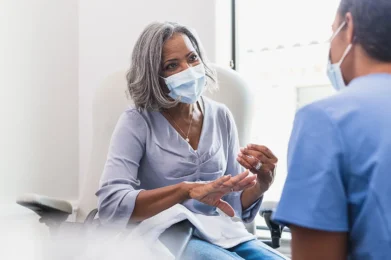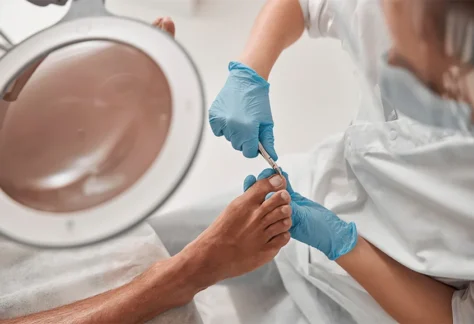In This Article:
- Millions in the U.S. get the stomach flu every year. Symptoms include watery diarrhea, stomach cramps, stomach pain, nausea, repeated vomiting, muscle aches, headaches and a low-grade fever.
- There is no quick remedy for stomach flu. You often must let it run its course. In the meantime, be sure to stay hydrated, let your stomach settle, ease back into food, get rest and be careful with medications.
- The stomach flu is contagious. If your family member has stomach flu, avoid getting it yourself by consistently washing your hands, keeping your distance, isolating the sick person, wiping off surfaces, washing clothes and bedding frequently and immunizing infants before they are exposed.
How to Get Stomach Flu Treatment
Millions of people get the stomach flu each year in the United States. Symptoms come on quickly and can include watery diarrhea, pain or cramping in your abdomen, to nausea, vomiting and sometimes fever. Known as viral gastroenteritis, stomach flu is a highly contagious intestinal infection that is unfortunately not affected by normal flu vaccines.
Although difficult to deal with, stomach flu typically goes away in a few days without any further complications. However for infants, the elderly, and people with weakened immune symptoms, the stomach flu can be dangerous. There is no specific treatment for stomach flu, so it’s important to stay hydrated and rest while allowing the flu to run its course. There are however, some at-home remedies that can lessen symptoms and make things slightly easier (Source: 1).
How do you get the stomach flu?
Although the stomach flu, or viral gastroenteritis is usually caused by a virus, it can also be caused by bacteria or even parasites. You can get viral gastroenteritis through contact with other infected people, or from contaminated food or water.
How to Know You Have Stomach Flu
The following symptoms indicate the presence of stomach flu (Source: 2):
- Watery diarrhea
- Stomach cramps and pain
- Nausea
- Repeated vomiting
- Muscle aches
- Headaches
- Low grade fever
What is the Quickest Way to Get Rid of Stomach Flu?
Although there is no specific treatment for the stomach flu, it’s important to stay hydrated as dehydration is the main complication of this illness. Also, don’t forget to rest and wash your hands frequently while allowing the flu to run its course. Doctors do not treat viral gastroenteritis with antibiotics. That’s because antibiotics treat infections that are caused by bacteria – not viruses.
While there is no quick remedy besides to let the flu run its course, there are some simple steps you can take to lessen symptoms and have an easier time. We recommend the following methods for at-home treatment of stomach flu (Source: 3):
Stay hydrated
Try sucking on ice chips or sipping water and electrolyte-infused liquids. Avoid any caffeinated sports drinks and try to stay hydrated.
Let Your Stomach Settle
This means stop eating any solid foods during the first few hours of symptoms and avoid eating foods with a lot of fat or sugar, which can make symptoms worse.
Ease Back Into Food
Only begin to eat again after you feel the vomiting and nausea has abated. After a few hours, evaluate if you can take some easy-to-digest foods such as crackers, toast, bananas, rice, and chicken. Avoid food if any nausea returns.
Stay Away From Certain Foods
Stay away from dairy products, caffeine, alcohol, nicotine, and fatty or highly seasoned foods. Anything that may upset your stomach lining is risky (Source: 4).
Get Rest
Get plenty of rest and avoid any strenuous exercise. You can get dehydrated even more easily in our hot and dry climate.
Be Careful with Medications
Medications that contain ibuprofen such as Advil, Motrin, and others should be avoided during symptoms. Others such as acetaminophen (used in Tylenol) should be used cautiously. On an empty stomach some of these drugs raise the risk of damaging the liver and stomach lining.
How Soon Can You Start Eating Food After Stomach Flu?
You should be able to start eating normally again within 24 to 48 hours of symptoms beginning. Start with simple foods such as crackers, toast, bananas, rice, applesauce or chicken. Depending on the cause, stomach flu symptoms may appear within one to three days after infection and can range from mild to severe. Symptoms usually last less than a day.
How Do You Avoid Getting Stomach Flu When Your Family Has It?
It’s vital to halt the spread of stomach flu if you have family members, friends, or coworkers who are exhibiting possible symptoms. Some preventative measures can be taken ahead of time in order to stop the spread of stomach flu. Precautions include (Source: 5):
- Consistently wash your hands with soap and water
- Keep distance from people infected with stomach flu
- Immunize infants before they get exposed
- Keep any sick family members isolated and restricted to one room
- Wipe off surfaces and clean countertops and spray surfaces with disinfectant
- Wash clothes and bedding frequently and avoid changing your child’s diaper near where you prepare food and wash your hands after.
*Take precautions when traveling
Treatment for stomach flu involves continuing to monitor symptoms and hydration levels for the duration of sickness. Over-the-counter anti-diarrhea medication such as imodium or Pepto-Bismol can provide some short-term relief, but check with your primary care physician before taking any OTC medications.
Should I call the doctor?
Call your doctor or seek emergency care if you have:
- Any symptoms of dehydration such as excessive thirst, dry mouth, deep yellow urine or little or no urine, and severe weakness and lethargy, dizziness or lightheadedness
- Diarrhea or vomiting that lasts longer than 2 days
- Vomit up blood, have bloody diarrhea, or severe belly pain
- Have not had anything to drink in a few hours
- Have not urinated in the past 6 to 8 hours (during the day), or if your baby or young child hasn’t had a wet diaper for 4 to 6 hours
For more information about stomach flu and possible treatment, contact Valleywise Health professionals. For serious symptoms or symptoms that last longer than three days, contact an emergency room near you and seek treatment as soon as possible.
Sources:
- https://www.niddk.nih.gov/health-information/digestive-diseases/viral-gastroenteritis/definition-facts
- https://www.niddk.nih.gov/health-information/digestive-diseases/viral-gastroenteritis/symptoms-causes
- https://www.niddk.nih.gov/health-information/digestive-diseases/viral-gastroenteritis/treatment
- https://www.niddk.nih.gov/health-information/digestive-diseases/viral-gastroenteritis/eating-diet-nutrition
- https://www.cdc.gov/norovirus/about/prevention.html
- https://www.niddk.nih.gov/health-information/digestive-diseases/viral-gastroenteritis
- https://www.cdc.gov/norovirus/about/treatment.html








